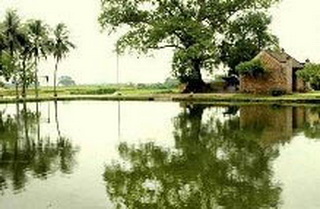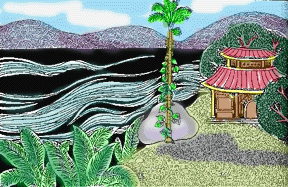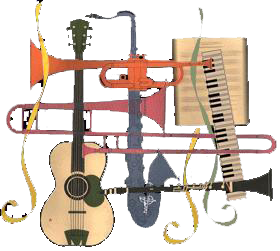Cung-Oán Ngâm-Khúc
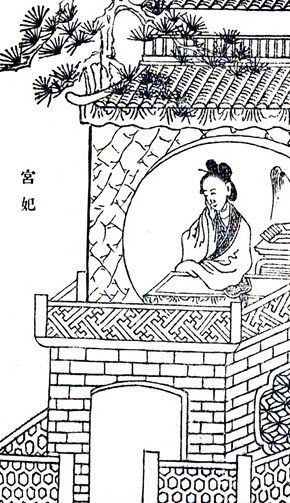
Cung-oán ngâm-khúc
(trích đoạn 49-76)
...Kìa thế cục như in giấc mộng,
Máy huyền vi mở đóng khôn lường,
Vẻ chi ăn uống sự thường,
Cũng còn tiền định khá thương lọ là.
Đòi những kẻ thiên ma bách chiết,
Hình thì còn bụng chết đòi nau,
Thảo nào khi mới chôn nhau,
Đã mang tiếng khóc ban đầu mà ra!
Khóc vì nỗi thiết tha sự thế,
Ai bày trò bãi bể nương dâu,
Trắng răng đến thuở bạc đầu,
Tử, sinh, kinh, cụ làm nau mấy lần.
Cuộc thành bại hầu cằn mái tóc,
Lớp cùng thông như đúc buồng gan,
Bệnh trần đòi đoạn tâm toan,
Lửa cơ đốt ruột, dao hàn cắt da.
Gót danh lợi bùn pha sắc xám,
Mặt phong trần nắng rám mùi dâu,
Nghĩ thân phù thế mà đau,
Bọt trong bể khổ, bèo đầu bến mê.
Mùi tục vị lưỡi tê tân khổ,
Đường thế đồ gót rỗ kỳ khu,
Sóng cồn cửa bể nhấp nhô,
Chiếc thuyền bào ảnh lô xô mặt ghềnh.
Trẻ tạo hóa đành hanh quá ngán,
Chết đuối người trên cạn mà chơi.
Lò cừ nung nấu sự đời,
Bức tranh vân cẩu vẽ người tang thương...
Ôn Như Hầu Nguyễn Gia Thiều
The Lament of an Odalisque
(verse 46-76)
The world in front of us perfectly resembles a dream,
Its mysterious and delicate machinery unpredictably opens and closes,
More important things aside, even mundane acts like eating and drinking
Are unfortunately decided in advance.
Many lives are fraught with so much stress and failures,
People are still there but inside they have died many times,
No wonder on the same day when their placenta was buried,
They had entered this world with their first cry.
They cried for the slings and arrows of life,
Who created this game of perpetual change?
From childhood until old age,
How many times do we suffer death, birth, fear and scares?
Success and failure stunt our hair,
Impasses and advancements petrify our liver,
This illness of life erodes like acid into our heart,
Hunger burns our entrails, the cold cuts into our skin.
In our pursuit of wealth and fame, our heels are tinged gray with mud,
Our weather-beaten face is sunburnt like a strawberry,
It hurts to think of our drifting destiny,
Like foams floating on the sea of suffering, duckweed at the shore of delirium.
The taste of life numbs our tongue with its bitterness,
Our heels are bruised on the rugged path of life,
Among rolling waves at the river estuary,
The boat of illusion heaves and plunges in the whirlpool.
The creator, like a meddlesome child, disgusts us,
It takes pleasure in drowning people on dry ground,
In its immense oven, it bakes all things to life.
In the picture drawn by moving clouds, how miserable is the human shape.
Translated by Hien V. Ho
11/5/2020
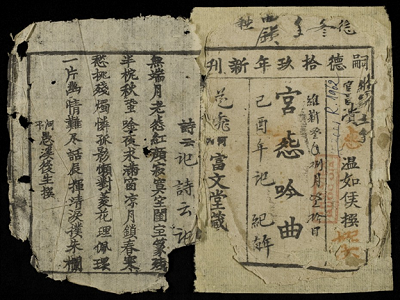
Woodblock print of Cung-oán Ngâm-khúc (early 20th century) at the National Library of Vietnam (https://sea.lib.niu.edu/islandora/object/SEAImages:nlvnpf0012collection#page/10/mode/1up)
Ôn Như Hầu (Marquis) Nguyễn Gia Thiều was born in the village of Liễu Ngạn, province of Bắc Ninh 1741 and died in 1798 in his native village.
His father was a high ranking general and his mother was the daughter of a Trinh Lord whose family had its own court and was the real power behind the King who reigned only in name.
Educated since an early age in letters as well as in martial arts at the Trinh court, he served in the military since the age of 18. For his military achievements and because he was trusted by the powerful Trinh Lord, he was given the title of Marquis (Hầu). However, in his later years, his public service was more erratic; he enjoyed poetry, literature, history and religion and led a quiet life of leisure.
After the fall of the Lê dynasty in 1786 caused by the Tây Sơn revolutionary movement, Nguyễn Gia Thiều declined an invitation to participate in the new administration under Emperor Quang Trung. He returned to his native village and stayed there until his death at the age of 57.
His main work in poetry, Cung-oán ngâm-khúc (The Lament of an Odalisque) of the elegy or "ngâm" genre , with 356 verses, was written in Vietnamese demotic characters (chữ nôm). The theme developed was about the sad condition of the abandoned and reclusive royal concubines. This classic work, deeply influenced by Buddhism and very pessimistic in its view of human existence, is also one of the main masterpieces of “nôm” literature.
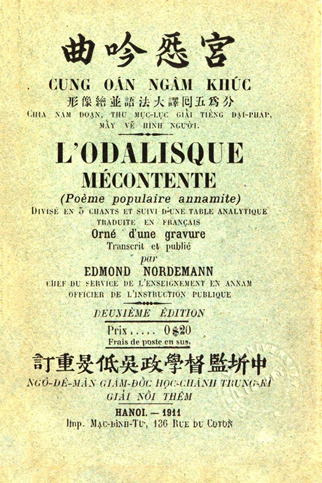 Cung-oán ngâm-khúc has been translated into French several times. A French version titled “L’Odalisque mecontente” was published in Hanoi in 1911 by Edmond Nordemann who also translated many other Vietnamese classical texts such as Kim Vân Kiều, Bích Câu Kỳ Ngộ, Gia Huấn Ca (by Nguyễn Trãi), and wrote a manual of Vietnamese traditional medicine and many treatises about Vietnamse and Chinese languages .
Cung-oán ngâm-khúc has been translated into French several times. A French version titled “L’Odalisque mecontente” was published in Hanoi in 1911 by Edmond Nordemann who also translated many other Vietnamese classical texts such as Kim Vân Kiều, Bích Câu Kỳ Ngộ, Gia Huấn Ca (by Nguyễn Trãi), and wrote a manual of Vietnamese traditional medicine and many treatises about Vietnamse and Chinese languages .
“L’Odalisque mecontente” has a preface written in Vietnamese by the translator himself, using a Vietnamized version of his French name: Ngô-Đê-Mân:
“This poem “The Discontented Odalisque” is written by a Marquis of On-nhu who is said to have lived towards the end of the Le dynasty. It is probable that this dignitary, endowed with a penetrating and lucid mind, a flexible and shrewd intelligence, was first taken in affection by the sovereign and provided with the highest offices. But the prince, quite inclined to listen to different sides, would then have grown weary of the marquis, whom he would eventually dismiss.
Evoking in his disgrace centuries of Chinese antiquity, the courtier poet discovered that a young odalisque, whose talents and virtues were linked to an accomplished beauty, had a fate as unhappy as his. He decided to take advantage of this similarity of situations and took the subject of this elegy. Although its words are full of sadness and bitterness, its meaning is elevated, it shows the author’s vast erudition, and allusions to ancient books abound. In truth, it is an endearing poem, worth reading.” (Translated from Nordemann's French version of the preface by Hien V. Ho)
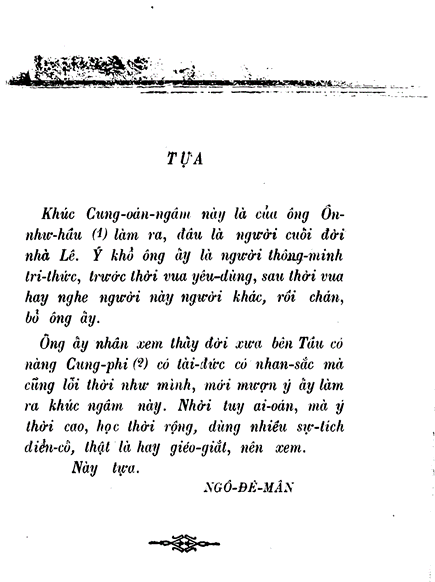
A Vietnamese author, Phạm Gia Kính, translated it into French in 1945 under the double title: “Plainte du harem ou La désenchantée” (Complaint from the harem or The disillusioned).
The following excerpt in French corresponds to the text under discussion:
Oui le monde que nous regardons est semblable à un rêve.
Ses ressorts mystérieux vont et viennent à notre insu,
Manger ,boire actes futiles et vulgaires
Et pourtant, hélas! tout cela n'en n'est pas moins fixé d'avance!
Nombreux sont ceux-là qui s'imposent mille peines et cent fatigues:
Ils existent bien d’ apparence, mais leur cœur est mort de longtemps.
Comment s'étonner qu'à peine hors du sein maternel
Nous apportions déjà des pleurs, en premier tribut à la vie?
Nous pleurons, par pitié les choses de ce monde.
Qui donc inventa ce drame, où alternent la mer et les champs de mûriers?
Depuis nos premières dents blanches jusqu'aux cheveux d'argent de la vieillesse,
Mort, naissance, inquiétude ou crainte, quelle torture de chaque jour !
Le souci des échecs et des succès dégarnit presque notre front,
L’alternance des beaux et mauvais jours semble nous brûler jusqu'au foie
Les maladies viennent souvent nous déchirer coeur ou poitrine,
Le feu de la faim dévore nos entrailles, les couteaux du froid coupent notre chair.
Dans la course aux honneurs et aux gains nos talons se salissent de boue grise,
Vents, poussière ou soleil halent nos faces couleur de mûres.
Quelle douleur de songer à l'instabilité de l'homme
Ecume flottant sur la mer des souffrances, lentilles d'eau dérivant vers le port des rêves.
Toutes les saveurs de ce monde à notre langue sont acres ou amères
Le chemin de la vie meurtrit nos talons fatigués.
Sur les vagues irritées dans le havre incertain que battent les flots,
Notre esquif d’ecume et de chimeres se debat à la surface des eaux.
Créateur inconscient, quelle est ta cruauté!
Tu t'amuses à nous noyer jusque sur la terre ferme,
C’est à un feu ardent que tu fonds nos destins.
Quel tableau! Une meute de nuages courant après un fantôme, ni mer ni mûriers!
From Cung Oan Ngam Khuc
Traduction française de Phạm Gia Kính
Plainte du harem ou La désenchantée
.
Hanoi
Editions Alexandre de Rhodes
1945
Hien V. Ho
11/7/2020


